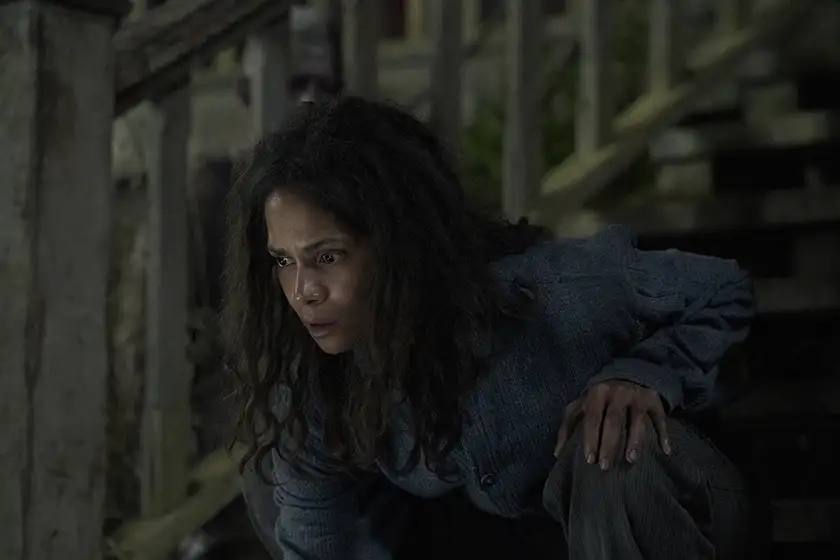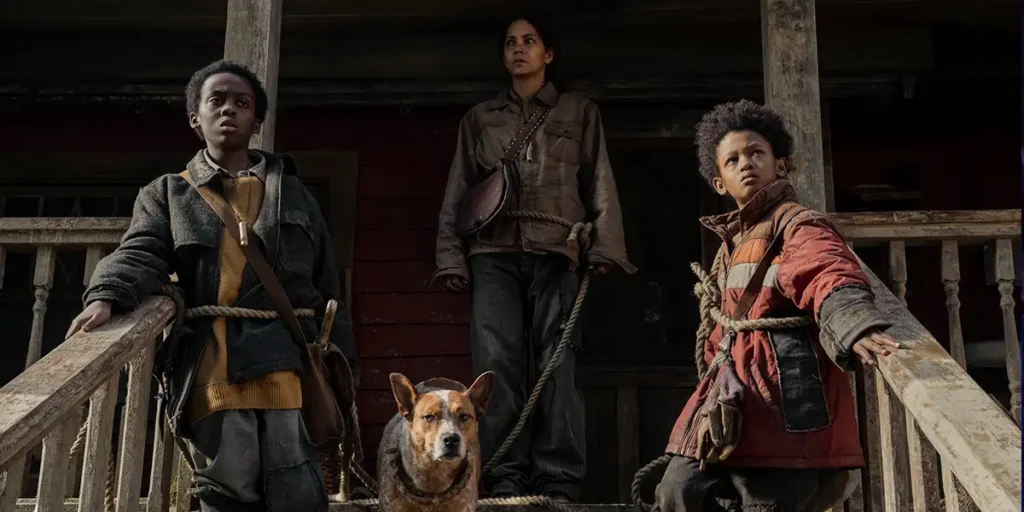Alexandre Aja’s Never Let Go has some powerful performances from its talented cast, but a derivative script and poor pacing let it down.
Director: Alexandre Aja
Genre: Horror, Thriller, Mystery
Run Time: 101′
US Release: September 20, 2024
UK Release: September 27, 2024
Where to watch: in US theaters, UK & Irish cinemas, and globally in theaters
During my screening of Never Let Go, an interesting thing happened. Around 20 minutes in, two people entered the room, stood near the exit, and watched the screen while deciding whether or not to stay. After at least 5 minutes, they decided to leave and never returned. It was an amusing anecdote to think about while enduring many of the film’s weaker moments. If it struggled to grab two people for more than 5 minutes, how could it stand to do that for over 90?
Unfortunately, Never Let Go fails to maintain any interest and instead comes out on the other side as one of the blandest movies to be released this year.
The premise of Never Let Go feels largely cribbed from others in the post-apocalyptic subgenre. We follow a young mother (Halle Berry, of Bruised) with her two sons, Samuel (Anthony B. Jenkins) and Nolan (Percy Daggs IV). The family live deep in secluded woods and follow strict rules enforced by the mother to protect each other from a mysterious evil that has seemingly destroyed the world. While the children cannot see this terrifying being, the mother processes the ability to see this evil and uses this skill to keep her children safe. The mother utilises a rope system to keep her and the children linked together when outside, with the one rule that, under no circumstances, do any of the children detach. After a severe accident leaves one of the children injured but alive even without the rope, seeds of doubt are cast on the mother and the possibility of whether or not the evil they spent their lives fighting back against is real.
Where Never Let Go shines is in its two performances by its younger cast. Both Anthony B. Jenkins and Percy Daggs IV do an excellent job of channelling the childhood naivety of their characters into something more sinister yet heartbreaking as the film enters its climax. Their dynamic feels authentic and quite engaging in a way that the overall narrative could only hope to achieve. The premise of these two children making the possible discovery that they have been misled all their lives and all the challenges that can bring is quite compelling, but sadly, this is tossed aside for a blunt story that leaves no room for interpretation. Many questions the script asks are often immediately answered with no room for exploration, leaving its wider thematic swings to feel more undercooked than bold and imaginative.
Much of Never Let Go’s influences stem from other post-apocalyptic movies like Bird Box and A Quiet Place. This isn’t surprising, as Alexandre Aja is a director who often defines himself by what inspires him. Whether it’s the B-movie trappings of Piranha 3D or the mid-2000s energy felt in his remake of Wes Craven’s The Hills Have Eyes, Aja is a director who has been surrounded by not just the stories that influenced him but also the people who made them. With Never Let Go, those inspirations are largely absent and replaced with a generic sample of tired ideas that leave both the direction and the script lacking a voice. It’s ultimately left sampling from other movies that even struggled themselves to find their own identity.

The core issue with Never Let Go is that while the pieces are there to tell a potentially compelling narrative, it never comes together in a way that demands you to care about what’s on screen. Alexandre Aja can direct his way around some very compelling visuals, but even here, he’s ultimately left to work with a tired playbox of tricks from a subgenre in horror that has been done to death at this point. The rules that are introduced for its characters and narrative, from the importance of the rope to what happens when this mysterious creature gets its hands on you, are uninteresting at best and straight-up nonsensical at worst. As we approach the third act, this ruleset gets increasingly shaky in its footing, and after a while, it’s easy to wonder why the film is still trying to follow them. At times, Alexandre Aja does provide some gruesome visuals that bring a more visceral touch that another director would perhaps not consider. Still, it’s ultimately window-dressing for what amounts to nothing more than a very bland movie.
Outside of the horror, the drama and mystery elements of Never Let Go feel incredibly one-note. Even with a runtime of just 100 minutes, the pacing here is especially tough to sit through with a second act that drags along at an unbearably slow speed. There’s nothing here that’s catastrophically bad, and the strong performances from its duo of younger performers are always engaging, but it all ultimately serves a narrative that’s far too safe to execute in an actual compelling way. Halle Berry’s performance as the mother especially feels neutered because of the material’s lack of interest in exploring her issues. Whether or not these evil visions she sees are real or are a form of mental illness is a debate that the script largely avoids answering and instead tries to work with both conclusions to middling effect. It can’t commit to anything, so it attempts to do everything, with only enough time to perform its narrative beats in the most uninteresting fashion.
Alexandre Aja’s Never Let Go isn’t terrible, but it’s easily one of the blandest movies to drop this year. Despite the strong performances on hand, the derivative narrative and bloated pacing keep this from reaching its full potential, and it’s a real shame. The pieces are there for a very compelling story, but the end result is one that’s decidedly uninterested in offering anything beyond the most perfunctory version of itself.
Never Let Go is now available to watch globally in theaters.

